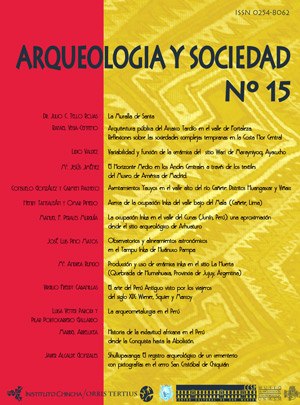VARIABILITY AND FUNCTION IN CERAMICS OF THE WARI SITE OF MARAYNIYOQ, AYACUCHO, PERU
DOI:
https://doi.org/10.15381/arqueolsoc.2004n15.e12733Keywords:
Central Andes, Wari, grinding stones, vessels, maize beer production, women.Abstract
In this paper I discuss the function of the pottery assemblage uncovered from the Wari site of Marayniyoq, in the Ayacucho Valley, of the central highlands of Peru. Using the ethnographic example as a model to define the function of pottery vessels, this study indicates that the large pottery vessels found at Marayniyoq were originally manufactured to store and transport beverages. Once broken, most of these large vessels were restored and reused. At this stage, the vessels were no longer used for the original purpose, but instead as storage vessels. Because at the site there is grinding equipment that suggests that grinding was also an important activity, it is apparent that the restores vessel were used to store grains that perhaps were used in fermented beverages such as chicha. Consequently, at Marayniyoq we have a clear evidence for the reuse of large pottery vessels. Because during Inka times fermented maize beer was produced by women, there is also some evidence that suggests that something similar also existed during the time of the development of Wari.Downloads
Published
Issue
Section
License
Copyright (c) 2004 Lidio M. Valdez

This work is licensed under a Creative Commons Attribution-NonCommercial-ShareAlike 4.0 International License.
THE AUTHORS RETAIN THEIR RIGHTS:
a. The authors retain their trademark and patent rights, and also on any process or procedure described in the article.
b. The authors retain the right to share, copy, distribute, perform and publicly communicate the article published in the Arqueología y Sociedad (for example, place it in an institutional repository or publish it in a book), with an acknowledgment of its initial publication in the Arqueología y Sociedad.
c. The authors retain the right to make a subsequent publication of their work, to use the article or any part of it (for example: a compilation of their works, notes for conferences, thesis, or for a book), provided that they indicate the source. of publication (authors of the work, journal, volume, number and date).






